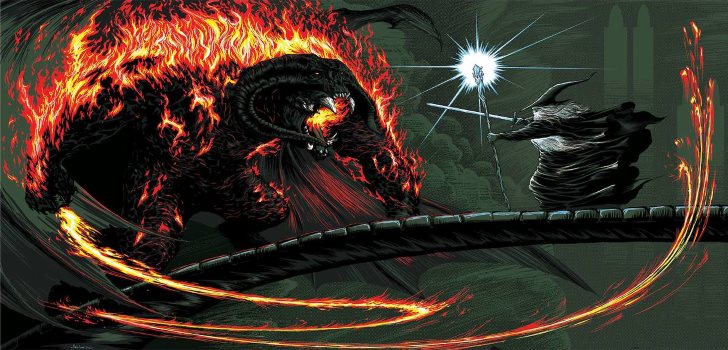So I will begin by saying in the interest of full disclosure that I am a total fanboy for all the writings of an author by the name of Brandon Sanderson. Despite this I will attempt to offer a cohesive presentation on his thoughts on writing and try to relate it without bias for the uninitiated to the Cosmere (Brandon Sanderson's fictional universe, Ed.).

Mr. Sanderson not only writes himself, but teaches writing as well and has come to coin what he refers to as Sanderson’s Three Laws of Magic. These are not hard and fast rules, but observations he has made in the span of teaching and his own writing that has helped himself and hopefully others. It has certainly helped myself further appreciate other authors, understand their processes, and their characters in ways I have not before. So without further ado, I shall begin with his first law.
The First Law of Magic
The First Law states:
An author's ability to solve conflict satisfactorily with magic is directly proportional to how well the reader understands said magic.
What this basically means, is the more a magic system is explained how it works, the more it can be used to solve problems. This rule is then broken down into roughly two forms, Hard Magic and Soft Magic. Hard Magic is when the magic system is almost completely flushed out, with defined capabilities and limitations. You can only do A, B and C with such magic system, but cannot do D because of E reason. Thereby the magic becomes a tool in which the character’s ingenuity in how he or she employs the magic is what interests and amazes the reader. An example of this is when a character named Kelsier in Sanderson’s Mistborn trilogy takes on a group of enemies. Kelsier can only mentally “push” or “pull” on metal objects from his own center of gravity in a limited form of telekinesis. Using a metal paperweight, Kel would “push” it at a target in front of him, then “pull” on it briefly towards himself while stepping out of its flight path and hitting the opponent behind him. This enabled him to sling the heavy object back and forth knocking out all the assailants. He used a limited ability in a clever way to solve his problem.
Soft Magic conversely, involves a magic system that is known in the book’s world, but what it can accomplish and what it cannot is usually presented on a case by case basis. In Soft Magic, what amazes the reader is the mystery and wonder of something outside our understanding. For example, in Lord of the Rings by J.R.R Tolkien, we largely do not understand how Gandalf’s magic works. Basically there is a need, and he accomplishes it in his own way. Due to this, we very rarely see Gandalf use his magic often, or to its full potential. When Gandalf faced the Balrog, he summoned his magic to get rid of it. As result Gandalf is not seen for the rest of the book. If Gandalf proceeded to do this through the entire trilogy, the story would no longer be a tale of two brave little hobbits overcoming seemingly impossible odds, but of a powerful wizard doing a normal days work. By limiting the use of magic, the writer becomes a “benevolent deity” rather than a Deus ex Machina. So in Gandalf’s case we are in awe of his might, but also humbled by his sacrifice. To be clear this is not to imply that between Hard Magic and Soft Magic that there is a clear “better” way of doing things. Both are equally valid, but each take a different approach.
The Second Law of Magic
The Second Law states:
Limitations > Powers
My father loves Superman because in his words “Now that is POWER!” This never sat well with me. I always preferred Spider-Man because in many cases his powers did not make his life easier. In fact in many cases they made his life WORSE. For a long time I saw Superman as a character that had everything handed to him. Only one thing could harm him, he grew up in a loving foster family, and his abilities made handling his two identities easier than a lot of superheroes. He could just “blur” in telephone booth to change clothes and do in seconds, what takes others much longer. Then I had two conversations with two friends that have absolutely nothing to do with each other, yet both love Superman. I asked each why, and surprisingly they came up with almost the exact same reason. What made Superman so great to my friends was neither his nigh invincibility nor his almost unlimited strength but in fact was the times he could not use them.
Sanderson expands on this very same reasoning. Anyone can make a generic character that is unstoppable, but what make them interesting are their motivations, their history, and what makes them who they are. In Superman’s case his limitations are a little green rock by the name of kryptonite and the ethics of his foster parents. Let us look at it this way, if you the reader had absolutely no knowledge of Superman, and I told you his one weakness was a green rock, what would be your next question? Why does this rock weaken Superman? Well the radiation it emits neutralizes his power. Why does this rock’s radiation do that? Well it’s actually a piece left over from when his planet blew up. His planet blew up? How is he here then? Well his planet was about to collapse so his parents sacrificed themselves to save him and……See my point? We go from an invulnerable titan, to an individual that has a history that defines him all because of a weakness. Even then a rock can be removed somehow, or be extremely rare, but a code of ethics on the other hand, well that follows you EVERYWHERE. Why doesn’t Superman just kill Lex Luthor? Well because his foster parents raised him to believe in the sanctity of life. So if a war breaks out, where innocents are whole sale slaughtered Superman will naturally step in right? Well if he steps in, do his actions set global policy? Is he now a weapon for war? How does he decide which side to take, and what if the information he draws his conclusion on ends up being flawed or manipulated? Again, a seemingly unstoppable being now has some very real and very big obstacles to deal with despite his abilities, making for a compelling and interesting character.
The Third Law of Magic
The Third and final Law states:
Expand what you already have before you add something new.
More often than not more things can be accomplished with one ability rather than with multiple, and often times having so many creates more problems than they can solve. Life does not happen in a vacuum and neither does magic. When coming up with magic for a world, the writer needs to realize the affect this magic can have on its population, its economy, and society on whole. Take for instance the role-playing game Dungeons and Dragons. There are numerous mid to higher level spells that a player wandering around with a group of friends can wield that could break an entire economy nonetheless reality. Transmutation, divination, domination, and necromancy are just a sample of whole SCHOOLS of magic that when possessed by even one person could alter the entire history of a culture. In a world where necromancy exists, how would a city handle their graveyard? Would cremation suddenly become mandatory? In a world where divination exists, would games of chance become non-existent? In a world where transmutation exists, how would natural resources be handled when they can just be changed from one to another? Why preserve a forest when after it’s all been cut down, you can just change grass to trees? Just one of these questions could change the layout of a city, what it uses for money, how it is built, and how it is run for a whole series of novels. Now imagine having to account for all three. Having many abilities in a story does not automatically equate bad writing, but expanding existing powers can frequently add more to the story than a whole new ability can.
So I hope I did an adequate job relating the laws. For further information from the horse’s mouth, I have included links to the original articles on Brandon’s website. Also if you are hankering for a new fantasy book to give a try, I highly recommend pretty much all his books. Enjoy!
Refererences on the author's website:
(Banner image is Gandalf vs Balrog by Mark Lone, used with permission)







0 Comments